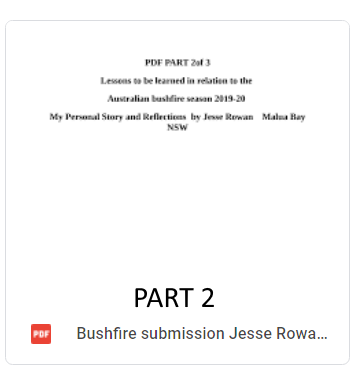Bushfire Royal Commission hears the personal story and reflections of Jesse Rowan
- The Beagle

- Jul 1, 2020
- 3 min read
In making her own submission to the Bushfire Royal Commission and to the NSW State Government Inquiry Jesse Rowan of Malua Bay brings the her story to those who now sit on these panels and hopefully, will bring to life the reality of the fires, their impact and their ongoing trauma that was brought to so many on the South Coast
Below is an extract of Part 1 of three parts that contain images, recollections, thoughts and concerns that will hopefully add weight to determinations and future actions.
My Personal Story and Reflections by Jesse Rowan

Above and below: Bushfire smoke seen from our front garden

NYE 2019 as Clyde fire approaches at 10:38am
Introduction
I live on the edge of Malua Bay, on the South Coast of NSW with my partner Terry and our three children aged 14, 17 and 22, all still living at home. We moved here in 2007 after experiencing the Canberra Firestorm of 2003, for a green and sea change. I have been a primary school teacher and a member of Malua Bay Rural Fire Brigade since 2008. I now work in partnership with my partner maintaining the Canberra Carillon bells and making fine flutes for export.
Having now been through two major bushfires, the Canberra Firestorm of 2003 and the Clyde bushfire NYE 2019, I would like to share my personal story as a glimpse into how
bushfires can impact people and whole communities psychologically, even when they don’t lose their home to the bushfire. I and many others have been traumatised by being in bushfires, or by preparing for and living with the constant stress of the possibility of being impacted or having friends and family in the same situation for many weeks, months, and fire seasons.
We did not evacuate at all as most people did, choosing to stay and defend our home. This meant we also experienced the days and weeks after the bushfires on site, and we have many insights to offer on problems experienced and suggestions for improvements.
As you are no doubt aware, this fire season our area and most of the East Coast of Australia experienced massive out-of-control megafires which burned for many weeks, along with similar fires in every state of Australia.
The bushfire season started in Australia in Winter, June 2019 and escalated as drought worsened with heatwaves and record-breaking temperatures. This fire season was predicted by weather and fire experts to be catastrophic. There is scientific consensus across the world (99 %) that global heating from fossil fuels is directly impacting bushfires, as well as other natural disasters and extreme weather events. This fire season has convinced me that we can no longer turn a blind eye and go with life as normal.
Since we moved to Malua Bay 13 years ago, every fire season has been a time of anxiety, especially on days of severe and windy fire conditions and in particularly dry seasons. This fire season since November 2019, we were either preparing and waiting anxiously as fires burnt uncontrolled and had the potential to impact us or our family in other places, or
experiencing disaster and its aftermath in a state of surreal disruption to our lives and work.
Bushfire survivors now live with the distress of knowing that people died, seeing our communities decimated, our environment devastated, animals burnt and lives ruined.
Many of us are further stressed and angered by the federal government’s refusal to listen to fire experts who warned them about this fire season before it even started, calling for more funding and resources that would be needed.
We are also further stressed and angered by the inaction of the federal government in dealing with climate heating, which is the cause of our fire seasons getting longer, hotter and unprecedented, with higher numbers of severe and catastrophic days.
Governments at all levels have a responsibility to keep communities safe. The only way to do this is to act on the source of the problem: burning fossil fuels. We must stop funding fossil fuel companies and move to clean renewable energy forms as soon as possible.
Bushfire survivors have segued from one emergency into another – the Covid-19 pandemic – before even having time to process and recover from the ordeal.
Isolation during the pandemic may well segue into the next fire season. I shudder to consider what could have happened if the pandemic had struck Australia during the height of the bushfires last season, and it may well yet happen.
Read on via the links below.....





